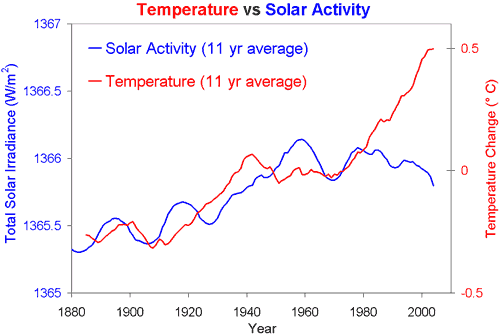I agree with that, which makes the original premise of this thread pretty much bunk. I also agree with this statement you made: “You need to establish causation, establish hypotheses, come up with tests for them, make predictions, and in general provide proof that the trend is not mere correlation or an accident of noisy statistics or due to an unknown common cause.”
My point was that this is exactly what’s been done.
And just as a side note, when short-term trends run counter to the long-term ones for some extended period – say around 20 years or so for global climate – there’s usually an identifiable cause other than just statistical chaos that’s worth looking for in the interest of improved scientific understanding. This was identified for the 50’s and 60’s as primarily sulfate aerosols, and was followed by an unprecedented jump in the rate of global warming in the following decades. Today the prevailing hypothesis is an increase in deep-ocean heat uptake, clearly an internal phenomenon that will likewise lead to another spike in warming.
Given this degree of violent agreement, let’s move on to what seems to be the crux of the issue…
What you seem to be saying is that “I agree with the incontrovertible facts about AGW, but there are too many uncertainties about the consequences for us to get too worried about it yet.” By implication, this seems to be saying that the science isn’t being honest, because the statements I quoted elsewhere from the world’s leading national science bodies or the IPCC are fairly definitive on the urgency of carbon mitigation.
The problem can basically be categorized into levels of understanding. The basic science is perhaps best represented by a couple of metrics called “equilibrium climate sensitivity” which is the real-world measure of where incremental atmospheric carbon will take global temperatures, and “transient climate response” which is essentially a measure of how fast it will take us there. These metrics are evaluated not just on current temperature observations but on a large repository of paleoclimate data and on well-validated models. This level of understanding is best exemplified by the IPCC Working Group I reports, which are the most attacked by denialists, and which is rather ironic because this is the most robust level of understanding. I suppose denialist loons feel they need to attack the basic underlying facts rather than argue about their consequences.
The second level of understanding is the consequences in terms of climate destabilization and ecosystem destabilization. This is the level addressed in the Working Group II reports, dealing with impacts, vulnerabilities, and adapation. There is a new WG II report coming out next month, and I would suggest that instead of expressing what Stephen Colbert would call the “truthiness” of gut-feel skepticism, that you at least read the Summary for Policymakers if not the technical summary or the entire report.
The third level of understanding comprises the realistic options for mitigation, and is embodied in the IPCC WG III. But as you correctly surmise, most denialists are still fighting at the level of WG I – the basic scientific understanding – and furiously trying to deny that we have any.
